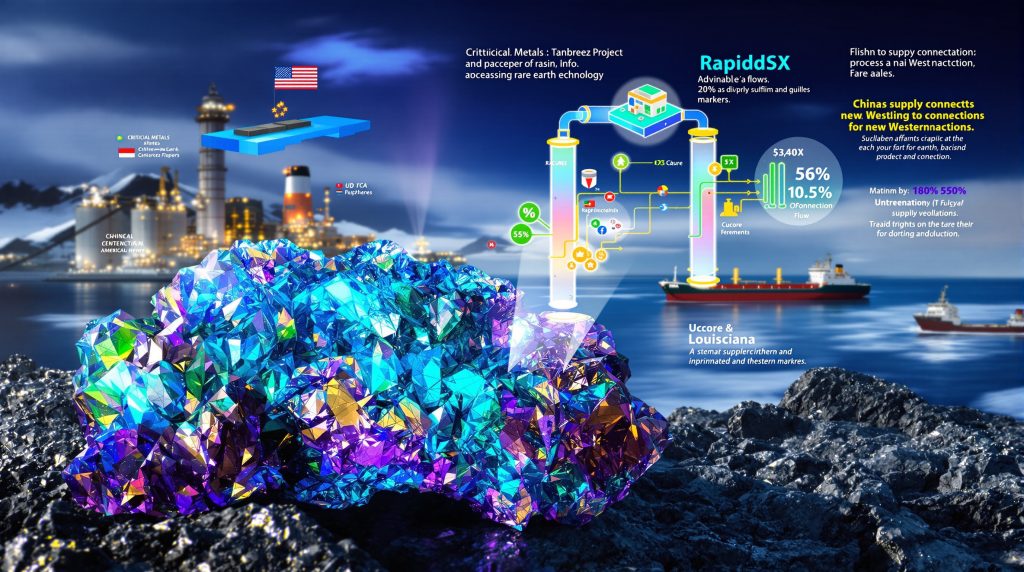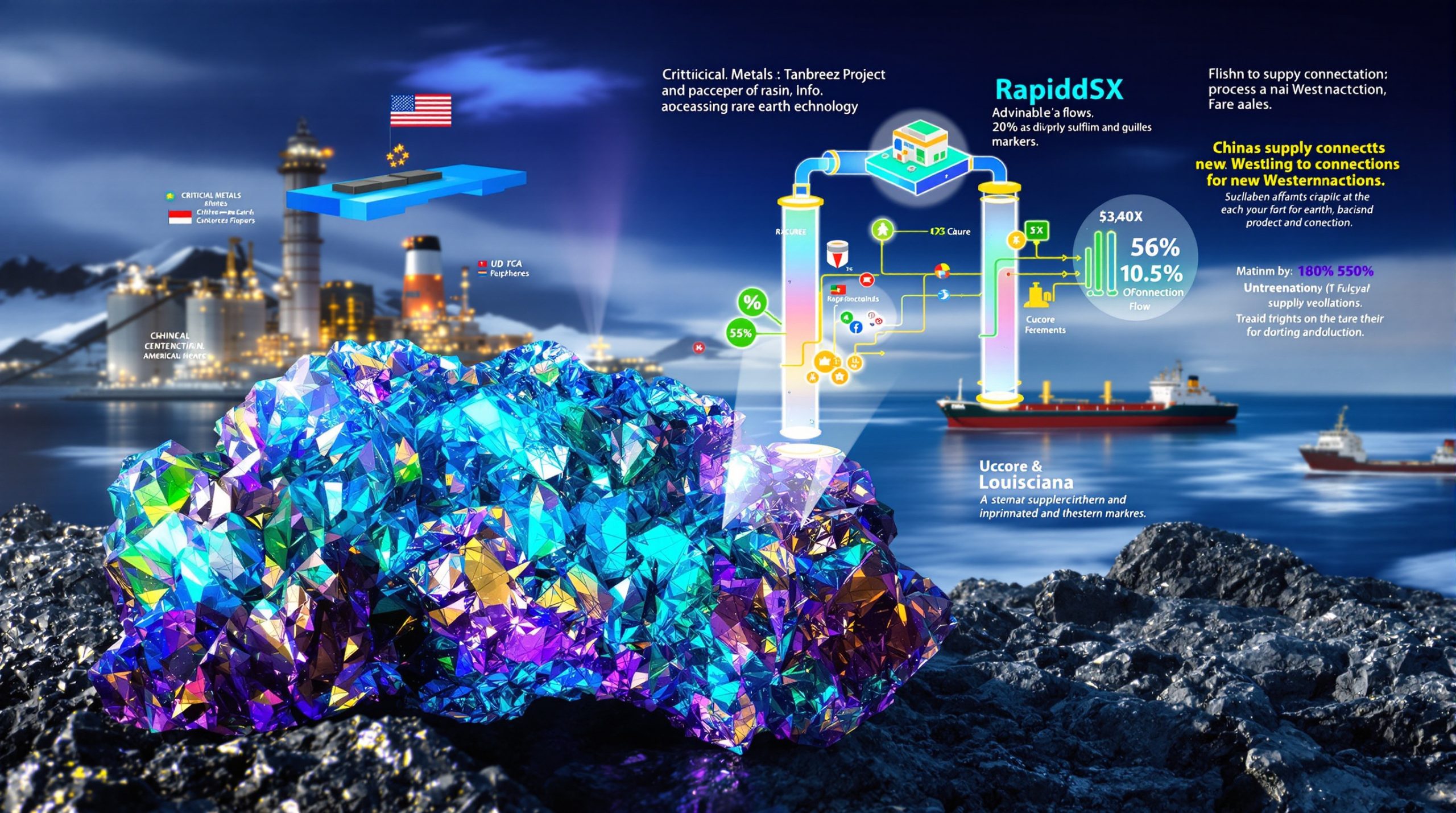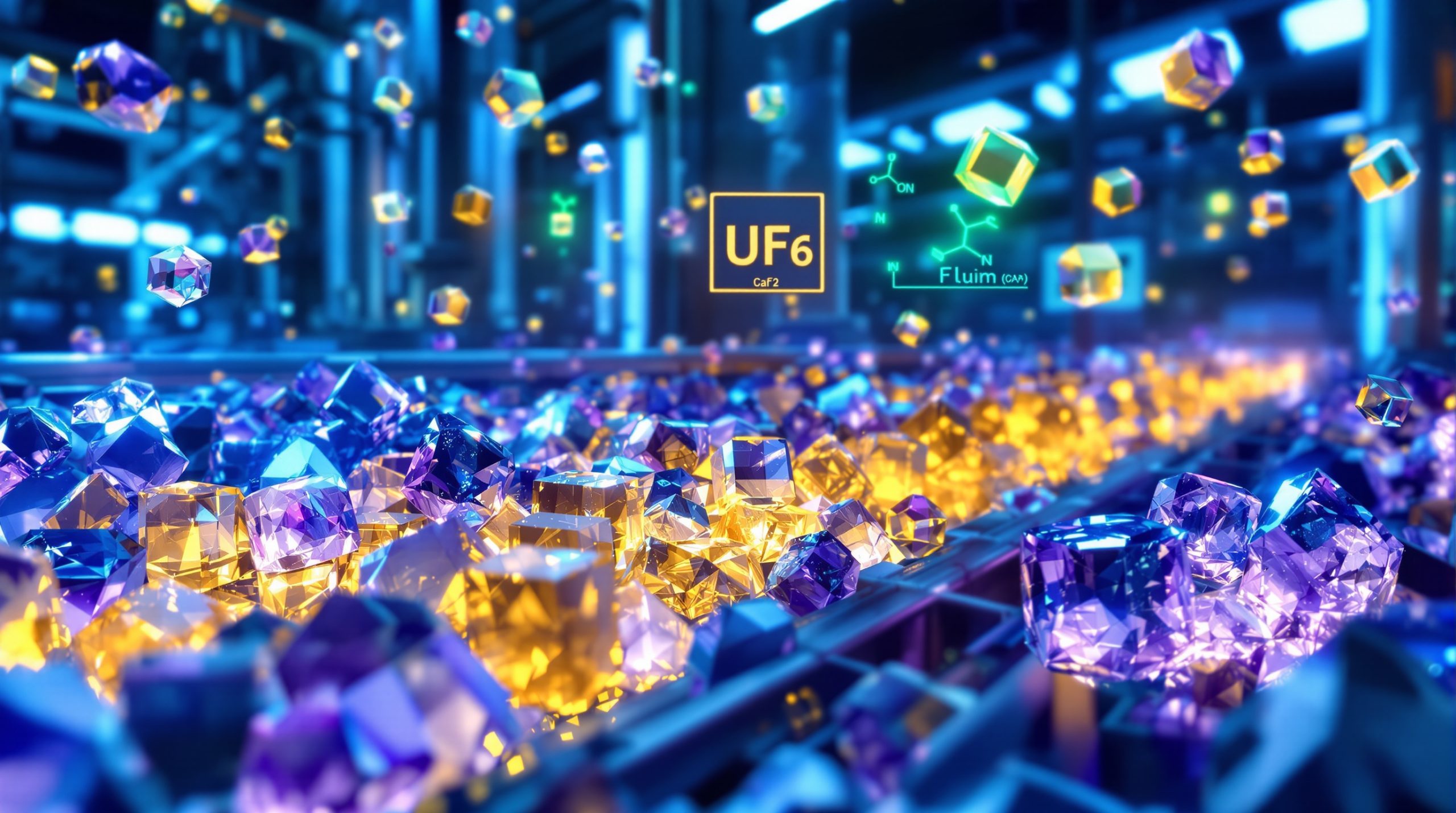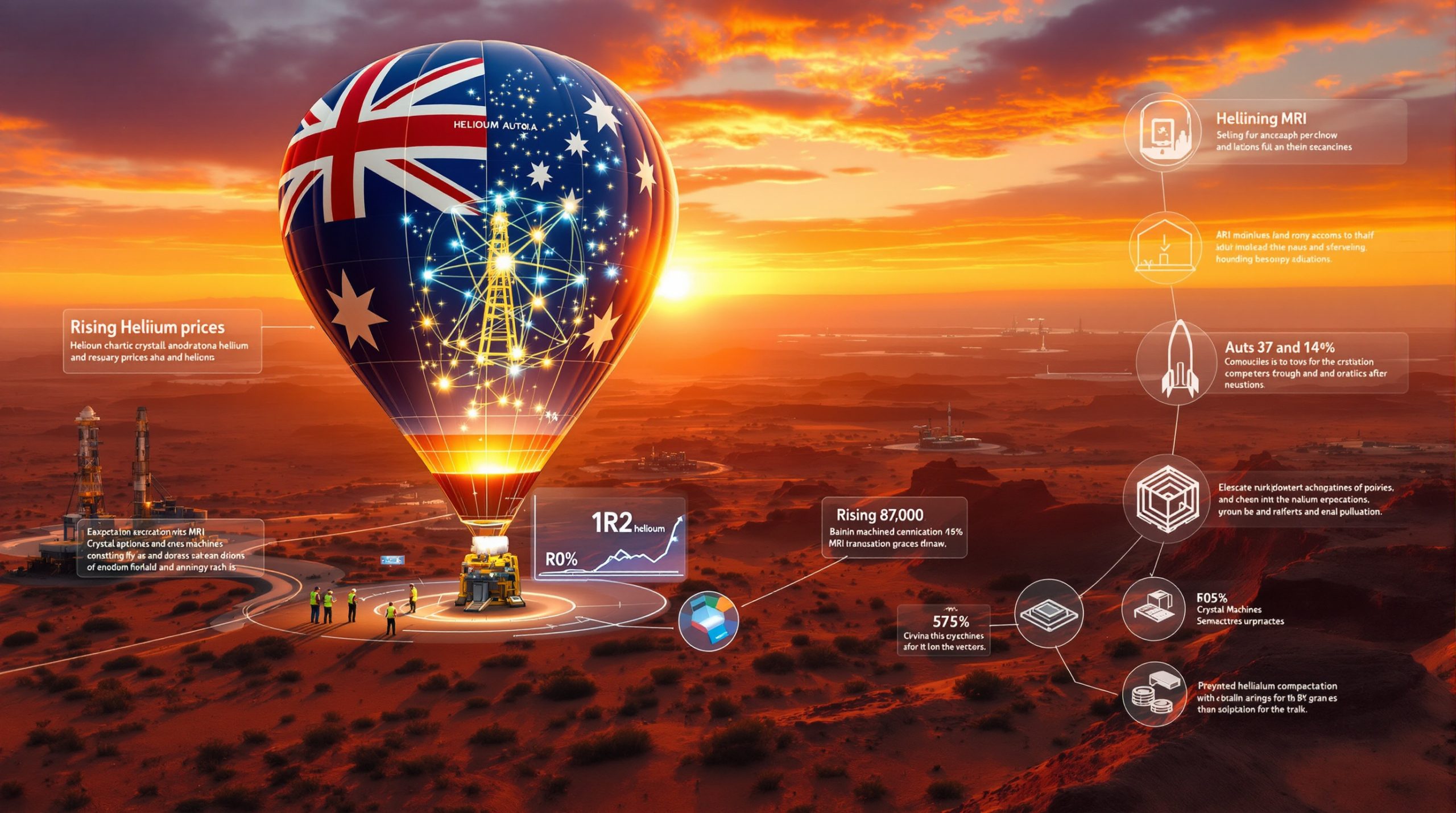Understanding Critical Metals Offtake Agreements: The Ucore Partnership
The strategic partnership between Critical Metals Corp and Ucore Rare Metals represents a significant development in Western efforts to secure rare earth supply chains. This comprehensive analysis examines the agreement's structure, strategic importance, and broader implications for the global rare earth elements market.
What is the Critical Metals-Ucore Offtake Agreement?
The partnership, formalized through a Letter of Intent in August 2025, establishes a multi-year supply arrangement where Critical Metals will provide up to 10,000 tonnes annually of rare earth concentrate from its Tanbreez Project in Greenland critical minerals to Ucore's processing facilities. This volume represents approximately 10% of Tanbreez's projected initial output, creating a cornerstone supply relationship while allowing Critical Metals flexibility for additional partnerships.
The agreement reflects both companies' shared vision to reduce China's dominance in the rare earth ecosystem in the Western world. As noted by Ucore CEO Pat Ryan, "Critical Metals Corp's Tanbreez offers tremendous opportunities for Ucore given the significant concentration of heavy rare earths it contains, which are essential for our processing facility in Louisiana and our downstream partners."
Critical Metals CEO Tony Sage highlighted the strategic value: "Securing this offtake provides Critical Metals Corp both with our first buyer and the flexibility to supply other US-based rare earth facilities in the future, given the immense size of our Tanbreez deposit."
How Does the Tanbreez Project Transform Western Rare Earth Supply?
The Tanbreez Project in southern Greenland represents one of the world's largest undeveloped rare earth deposits, with several distinctive advantages:
Massive Resource Base: The project contains extraordinary reserves of rare earth elements, positioning it as a potential game-changer in global supply dynamics. Its scale allows Critical Metals to commit substantial volumes to Ucore while maintaining capacity for additional partnerships.
Exceptional Heavy Rare Earth Concentration: The Tanbreez deposit contains a significant concentration of heavy rare earth elements (HREEs), which are particularly valuable for high-performance applications in defense, renewable energy, and advanced electronics.
Favorable Infrastructure: The project benefits from strategic location advantages including transportation infrastructure that facilitates efficient shipping of materials to processing facilities.
Regulatory Clarity: Having secured necessary permits from the Greenland government, the project has cleared significant regulatory hurdles that often delay mining projects in the Arctic region.
The project's development timeline aligns with growing Western concerns about supply chain vulnerabilities, particularly for materials essential to critical minerals energy transition and defense applications.
What Makes Ucore's Processing Technology Revolutionary?
Ucore's competitive advantage centers on its advanced processing technology, which represents a significant advancement over conventional methods used in rare earth processing:
Superior Efficiency: The company's processing approach demonstrates significantly faster separation capabilities compared to traditional methods, potentially reducing both capital and operating expenses.
Innovative Design: Ucore's technology employs a unique approach to rare earth separation that achieves better results with a smaller physical and environmental footprint.
Modular Scalability: The system can be readily reconfigured for separating various combinations of heavy and light rare earth elements, providing operational flexibility to adapt to changing market demands.
Validated Performance: Extensive testing at Ucore's facilities in Kingston, Ontario has validated the technology's effectiveness and scalability for commercial applications.
Ucore's Louisiana Strategic Metals Complex in Alexandria serves as the cornerstone of its commercial operations. The facility has received substantial support from the U.S. Department of Defense, recognizing its strategic importance to national security interests.
Why Are Rare Earth Offtake Agreements Strategically Critical?
The geopolitical context surrounding rare earth elements has intensified concerns about supply chain security:
Chinese Dominance: China currently controls a dominant share of global rare earth processing capacity, creating strategic vulnerabilities for Western nations dependent on these materials.
Export Restrictions: Historical precedents of export restrictions on rare earth elements have demonstrated the potential for supply disruptions based on geopolitical factors.
National Security Implications: Both Ucore and Critical Metals have emphasized the national security dimensions of their partnership, with Pat Ryan noting their shared goal to "meet the growing demand for rare earths while addressing national security challenges."
Trans-Atlantic Cooperation: The partnership represents an important example of cooperation between North American processing capabilities and European raw material sources.
Tony Sage of Critical Metals highlighted this strategic dimension, noting the partnership would support "the development of a robust supply chain in America that isn't reliant on China."
How Does the Agreement Impact Market Dynamics?
The rare earth elements market has experienced significant transformation in recent years, driven by accelerating demand from clean energy technologies, electric vehicles, and defence-critical materials strategy:
Value Creation: Heavy rare earth elements, which form the core of the critical metals offtake agreement with ucore, represent the most valuable segment of this market due to their essential role in high-performance permanent magnets.
Supply Security: For Ucore, the offtake agreement provides crucial supply security that enhances the viability of its processing operations and reduces market risks associated with securing adequate raw materials.
Operational Flexibility: The partnership structure provides both companies with operational flexibility, allowing Critical Metals to diversify its customer base while providing Ucore with a cornerstone supply commitment.
Favorable Policy Environment: Recent policy developments in Western nations have created market incentives for partnerships like the Critical Metals-Ucore arrangement, including preferential procurement policies for domestically processed materials.
The agreement potentially signals a shift in market dynamics, creating pathways for additional Western-based rare earth supply chains to develop with reduced dependency on Chinese processing capabilities.
What Are the Production Timelines and Capacity Targets?
The Critical Metals-Ucore partnership operates on a phased development timeline:
Development Phase: Critical Metals is advancing the Tanbreez Project toward production readiness while Ucore continues development of its processing facilities.
Commercial Production Launch: The offtake agreement anticipates deliveries beginning after both companies have completed their respective facility developments.
Processing Capacity Expansion: Ucore has outlined plans for phased capacity expansion at its Louisiana facility, allowing for gradual scaling of operations as market demand and supply availability increase.
Full Production Target: Critical Metals has described Tanbreez as having substantial production potential, with the initial offtake agreement representing only 10% of expected output.
This phased approach allows both companies to validate technologies and processes at commercial scale while building production capacity to meet growing market demand.
What Environmental Considerations Impact the Partnership?
Environmental sustainability has become increasingly important in rare earth operations:
Reduced Processing Footprint: Ucore's technology offers potential environmental advantages through more efficient processing compared to conventional methods.
Favorable Mineralization: Critical Metals has characterized Tanbreez as having mineralization that facilitates more environmentally responsible extraction compared to some other rare earth deposits.
Regulatory Compliance: Both companies operate under stringent North American and European CRM facility standards, in contrast to some operations in less regulated jurisdictions.
ESG Reporting: The partnership emphasizes environmental, social, and governance (ESG) performance metrics as increasingly important to investors and customers in the rare earth supply chain.
These environmental considerations reflect growing awareness of sustainability issues in critical minerals development and processing, particularly as end-users increasingly prioritize responsibly sourced materials.
How Does This Partnership Compare to Other Rare Earth Initiatives?
The Critical Metals-Ucore partnership represents one of several Western initiatives to develop rare earth supply chains independent of Chinese control:
Integrated Approach: The partnership creates connections between mining and processing capabilities, addressing a key vulnerability in Western rare earth supply chains.
Heavy Rare Earth Focus: While many Western initiatives have focused primarily on light rare earth elements, this partnership specifically addresses the more valuable heavy rare earth segment of the market.
Government Support: The substantial backing from the U.S. Department of Defense for Ucore's processing facilities demonstrates public sector commitment to rare earth supply chain development.
Commercial Viability: The partnership's emphasis on advanced processing technology and high-value heavy rare earth elements enhances its potential commercial viability compared to previous Western rare earth ventures.
The partnership's approach may provide important lessons for future rare earth supply chain development in Western nations seeking to reduce dependency on Chinese suppliers.
What Challenges Must the Partnership Overcome?
Despite its strategic advantages, the Critical Metals-Ucore partnership faces several significant challenges:
Technical Execution Risk: Scaling innovative processing technologies from demonstration to commercial scale involves inherent technical risks that must be carefully managed.
Capital Requirements: Both companies must secure substantial capital investment to develop their respective facilities according to the planned timeline.
Market Competition: Chinese producers benefit from decades of experience, substantial government support, and vertically integrated operations that provide competitive advantages.
Regulatory Hurdles: While initial permits have been secured, additional approvals will be required as the projects advance toward construction and operation.
Geopolitical Uncertainties: Shifts in international relations or changes in rare earth export policies could significantly impact market conditions and project economics, particularly in the context of ongoing US‑China trade war impacts.
Successfully navigating these challenges will require continued coordination between the partners, sustained government support, and effective risk management strategies.
What Are the Broader Implications for Critical Minerals Supply Chains?
The critical metals offtake agreement with ucore illustrates broader trends in critical minerals supply chain development:
Supply Chain Regionalization: Western nations are increasingly focused on developing regional supply chains for critical minerals rather than relying on globalized supply networks dominated by geopolitical competitors.
Public-Private Collaboration: The substantial government support for Ucore's processing facilities demonstrates the growing role of public-private partnerships in addressing strategic supply chain vulnerabilities.
Technology-Driven Solutions: Advanced processing technologies are central to Western efforts to compete with established Chinese rare earth operations.
Vertical Integration: The partnership reflects growing recognition that successful rare earth supply chains require coordination across mining, processing, and manufacturing stages.
These trends are likely to continue shaping critical minerals development strategies across Western nations as concerns about supply chain security intensify.
Further Exploration:
Readers interested in learning more about rare earth elements and supply chain security can also explore related educational content available from Mining Technology, which offers perspectives on developments in the global mining industry and critical minerals sector.
Furthermore, those seeking detailed information about the specifics of this partnership can review Green Car Congress's analysis of the deal's implications for the green technology supply chain.
Disclaimer: This article contains forward-looking statements about future production capabilities, market conditions, and project developments. Actual results may differ materially from projections based on various factors including regulatory approvals, market conditions, technical challenges, and capital availability. Readers should not make investment decisions based solely on the information presented here.
Looking to Spot the Next Major Mineral Discovery?
Get real-time alerts on significant ASX mineral discoveries through Discovery Alert's proprietary Discovery IQ model, turning complex geological data into actionable investment insights within minutes of announcements. Understand why major mineral discoveries can lead to exceptional returns by exploring Discovery Alert's dedicated discoveries page and position yourself ahead of the market.




